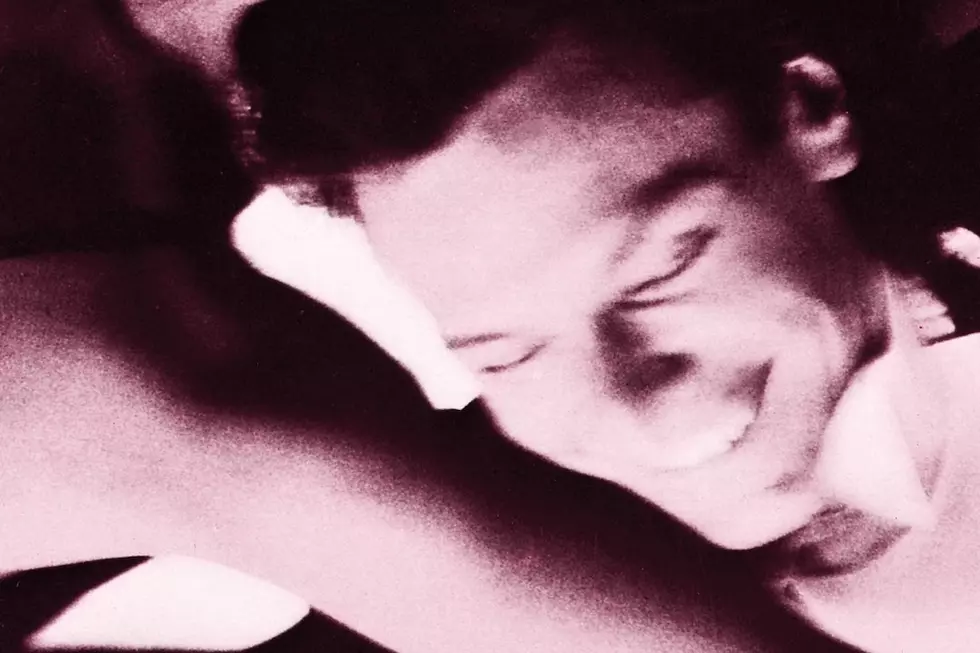
How Steve Winwood Survived the ’80s
Steve Winwood didn’t just survive the ’80s, he conquered the decade. After coming up as a teenage soul-singing prodigy with the Spencer Davis Group, then expanding the bounds of rock with free-thinking Traffic (with a short stopover in Blind Faith), Winwood stood alone in the ’80s. Alone, and on top – with the greatest success of his career coming at age 40.
There aren’t many artists who peak early and late, and plenty of people in the music industry thought Winwood – while incredibly talented as a singer and multi-instrumentalist – was washed out in the ’70s, when he hit his late twenties. Winwood thought so too. Physical maladies and a dissatisfaction with the never-ending cycle of a band’s operation caused the musician to retreat from the spotlight. He became a studio player, working on Lou Reed sessions, reggae albums and jazz projects.
The ’70s were “difficult. I spent a lot of it working for other people – John Martyn, Lou Reed, Toots and the Maytals, Sandy Denny,” Winwood recalled to the Daily Mail. “That actually proved to be a good thing, because I found out a lot about how other people work. I learned a lot about production.”
His recovery from peritonitis (an abdominal inflammation) took years and kept him off the road. The British musician retreated to the studio he built in his Gloucestershire home and worked on his solo debut with a couple of his old Traffic buddies. Winwood’s 1977 self-titled LP wasn’t a smash, but it kept him in the game. Although, at that point, he wasn’t sure he wanted to keep playing. In an era of punk and New Wave, Winwood almost decided on giving up on music.
Listen to Steve Winwood's 'Valerie'
“I think because of the experiences I was having through the early ’70s, I was almost preparing myself unknowingly for that, to go into some other area,” he told Rolling Stone in 1988. “I wasn’t desperate, I don’t think, but I was definitely ready to do whatever was necessary.”
What turned out to be necessary for Winwood was to give it one last try. He began working in his home studio, all alone, on the tracks that would become 1980’s Arc of a Diver. “On my second solo album, I gave it everything,” he remembered. “My record company thought I’d completely lost the plot, because I insisted on doing the whole thing myself – every instrument and all the engineering. I knew it was a gamble, but I felt it was something I could achieve, so I had to do it.”
Winwood’s record label since the Traffic days, Island Records, might have been dubious, although they gave him assistance when he was seeking a new songwriting partner. A great majority of Winwood’s previous work had been written in collaboration (Winwood delivered the music, with others focusing on the lyrics), and he was in the market for someone with a fresh perspective on his melodies.
Watch Steve Winwood's Video for 'While You See a Chance'
Island suggested he team up with Will Jennings, a former English professor who had gone into songwriting. At the pair’s first writing session, Winwood played Jennings the keyboard-driven demo for “While You See a Chance” and the lyricist was inspired. So was Winwood, who felt that his new partner had written lyrics that reflected the optimism he was feeling about his new music.
“We didn’t talk about what the song was about,” Winwood said. “He just came up with this lyric, and it was right for me, right for him and right for the song.”
When released as a single from Arc of a Diver in 1981, “While You See a Chance” topped even Winwood’s optimism, as the New Wavey song became a Top 10 hit in the U.S. It pushed Arc to platinum sales and big success, especially in North America. It looked like Winwood wouldn’t be packing it in and that Jennings would be his collaborator for the foreseeable future. (Jennings would have considerable success with others too; his credits include “Tears in Heaven,” “Up Where We Belong,” “Didn’t We Almost Have it All” and “My Heart Will Go On.”)
Still reluctant to tour, Winwood instead got to work on another solo disc – again producing, engineering and playing everything himself. His handful of collaborators on 1982’s Talking Back to the Night numbered Jennings as co-songwriter, then-wife Nicole on backing vocals, a co-engineer, a photographer and an album cover designer. That’s it.
While the DIY approach on Winwood’s previous album had been a virtue, the lack of outside input on this release might have hurt the record’s sound and, as a result, its appeal. Winwood took the blame for Talking Back to the Night being “under-produced,” in his words. But he continued to stand up for the songs, which had an anti-drug agenda spurned by both Winwood’s and Jennings’s friends who were battling addiction in the early ’80s. Although the message would be lost, Winwood would find a way to save the songs a few years later.
Talking Back to the Night wasn’t a flop, but it wasn’t Arc of a Diver either, and it again made Winwood uncertain about his future. Around the same time, he began having marital problems, which compounded his doubts about continuing as a professional musician. “I had actually been thinking of giving up music altogether and doing something else around that time in the ’80s,” he told the Daily Express. “I’d been doing music all my life and I’d had a lot of success, so I think I really just fancied a change. I suppose it’s like – does a footballer quit when he’s ahead in the game, or does he start to play down the lower leagues?”
On the verge of retiring, Winwood instead decided to make a series of changes that would impact the rest of his life. First, he got a new manager, Ron Weisner, who had worked with some of the ’80s biggest stars, including Michael Jackson, Madonna and Rick Springfield. Next, at Weisner’s encouragement, he moved to New York City in an effort to get away from his personal issues as well as the old way of doing things.
Watch the Video for Steve Winwood's 'Back in the High Life Again'
No longer an army of one, Winwood began working on his next album with a co-producer (Russ Titelman), as well as range of studio and star musicians that included Joe Walsh, Nile Rodgers, Chaka Khan and James Taylor. Jennings continued to write the bulk of the songs with Winwood, again settling on an optimistic tone in songs like “Higher Love” and “Back in the High Life Again,” inspired by the drastic changes in the artist’s life. These included his 1986 divorce, as well as his new romance with Tennessee native Eugenia Crafton. The couple wed in 1987, produced four children and are still married.
In the midst of making the Back in the High Live album, Winwood decided that he had to choose what kind of musician he wanted to be. Did he just want to play? Or did he actually want to be out front, touring the world, embracing a showman’s role?
“You have to decide which way to go,” he said. “I thought about it long and seriously, and I thought that if I sing songs to people, you can’t deny it, you’re an entertainer. It’s not just ‘I’m entertaining them’ but I am actually an entertainer’.”
His new manager, Weisner, helped Winwood translate his obvious musical talent in a visual way, both onstage and in music videos – the newly dominant promotional venue for music in the ’80s. Winwood found a way to be comfortable singing without hiding behind an organ, a piano or a guitar. Besides, it’s pretty hard to take refuge behind a mandolin, which the musician played on “Back in the High Life Again.”
But that mandolin-spiked single became a huge hit for Winwood, one of four Top 20 Billboard entries from the Back in the High Life album. The biggest was the slick, blue-eyed soul duet with Chaka Khan, “Higher Love,” which topped the charts in 1986 and dominated radios around the world. The album, with its celebratory title, marked a huge comeback for Winwood and cemented him as a solo star that earned critical praise and multi-platinum success, not to mention award show acclaim. The following year, Back in the High Life was nominated for six Grammys, winning three, including Record of the Year for “Higher Love.” That song’s video also had an impact at the 1987 MTV Video Music Awards, with seven nominations (although it lost out, like just about everything else, to Peter Gabriel’s “Sledgehammer” clip).
Listen to Steve Winwood's 'Higher Love'
In the middle of attending awards shows and touring to adoring crowds, Winwood helped compile a best-of collection, 1987’s Chronicles, which featured 10 songs from his solo career. He took the opportunity to improve the quality of three of the strongest tunes from Talking Back to the Night by having Tom Lord-Alge remix them. Their work was vindicated when “Valerie,” a single that Winwood felt had under-performed in 1982, shot up the charts in its remixed form, landing at No. 9 in the U.S. The sprightly, synthy song became another in a series of smashes, and Winwood’s arc wasn’t done.
Although Winwood’s reign as one of pop’s biggest stars wasn’t over, his contract with Island Records was. Coming off an incredibly successful couple of years, the musician signed a multimillion-dollar, three album contract with Virgin that manager Weisner called “insane.” Winwood went right back to work, taking musical inspiration from all of the time he’d spent in the American south with his new wife. “I’ve been learning about the history of R&B,” Winwood said. “A lot of the people from Memphis and Muscle Shoals are all in Nashville now, and I’ve been meeting them.”
Some of those folks included the Memphis horns, Wayne Jackson and Andrew Love, who had played on ’60s soul hits on Stax Records by Otis Redding and Sam and Dave and now joined Winwood for the Roll With It album. As such, the record took on the characteristics of Stax’s brassy, forceful R&B, although under the gloss of a clean, then-modern production (helmed by Lord-Alge). Winwood’s Virgin debut became his first-ever No. 1 LP, with a No. 1 single in the form of a rollicking title track that allowed him to employ his soulful shout.
Watch Steve Winwood's 'Roll With It' Video
But the album also encountered a bit of controversy, especially among the rock press and some of Winwood’s longtime fans. In exchange for tour sponsorship, Winwood had granted Anheuser-Busch’s Michelob the right to use one of his new songs in the lager’s television commercials. When a Michelob ad campaign began appearing with the Winwood/Jennings tune “Don’t You Know What the Night Can Do?” before the June 1988 release of Roll With It, many assumed that the rock legend had stooped to write a beer jingle.
Winwood explained that he had recorded the song for his album first, but fans and critics remained dismayed by his agreement to act in commercials and display Michelob banners at his concerts. Winwood argued his case in the press.
“The thing I want to do as a musician is to reach more people with my music,” Winwood told Rolling Stone. “If they can use part of it on a commercial, then I’m reaching potentially more people. The fact that it’s on TV and in commercials – music is entertainment. That’s the way I see it: music is entertainment, and commercials can be entertaining. So I’m happy with it.”
See Michelob's 1989 Ad Featuring Steve Winwood's 'Don't You Know What the Night Can Do?'
Winwood wasn’t the first to agree to corporate sponsorship, he wasn’t even the first rock star to be tapped by Michelob, which also employed songs with “night” in the title by Phil Collins, Genesis and Winwood's old buddy Eric Clapton. This approach would become commonplace among both classic and current artists in the decades to come. It’s almost quaint to think about Michelob’s use of Winwood’s song as controversial. One can only wonder why Miller didn’t use “Back in the High Life Again.”
Roll With It, and its subsequent tour, would effectively mark the end of Winwood’s spell in the “high life,” at least when it came to pop stardom. He has continued to make solo albums, experiment with different genres and reteam with old friends for pseudo Traffic and Blind Faith reunions. He’s become an elder statesman of rock with one of the most incredible resumes. But, in terms of popularity, nothing can rival the pinnacle of Winwood’s ’80s success. And to think, he almost gave up.
30 Most Outrageous '80s Rock Fashions
More From KYBB-FM / B102.7










